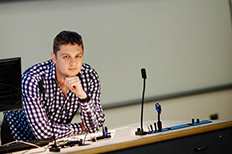
 Dr Tilman Davies
Dr Tilman Davies
Department of Mathematics and Statistics
Data is a ubiquitous resource in the digital age, but it's only useful if it is handled properly, says Dr Tilman Davies.
“Whatever the study, data collection has to be well-designed and well-analysed, or the resulting information will have no value.”
Tilman realised the value of statistics early on at university in Australia. “They're not just about batting averages — they're everywhere.” When his supervising professor moved to New Zealand, Tilman gained a scholarship to follow him for an honours degree.
“There's a real need for students with skills in statistical methods. They're involved in almost everything and there are all sorts of jobs these days for people who can interpret and analyse data.”
After graduating, Tilman spent a year with a biostatistical consulting firm in the USA before returning to New Zealand for a PhD. “I realised I loved the freedom to follow your own path that comes with academic research and teaching.”
He tells students that there is nothing to fear about statistics. “Many may initially be forced to do statistics to support other subjects but when they see the real world implications of the subject they soon lose their preconceptions and get enthusiastic.
“People are crying out for graduates with good skills in statistics, because that's what the world needs to make sense of all the data we are collecting in all walks of life.”
Tilman's recent collaborations include research in physiology, epidemiology, physiotherapy and archaeology. He has just received a Marsden Fund grant to develop new methodology and completed a textbook on statistical computing.
“Statistics is a discipline in itself — that's where techniques and methods come from — but also used in so many other disciplines.
“Even if it is not your main subject, a second major or a minor in statistics goes a long way to show your real world skill-set in logic and thinking.
“Behind almost all scientific research there will be statisticians working with data — and people prepared to pay them.”